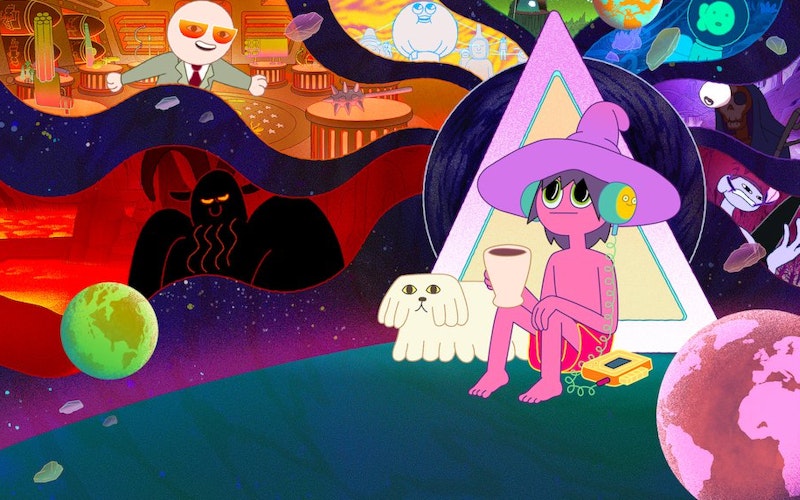
TV
The Midnight Gospel's Kinda-Good News
According to a recent interview, comedian Duncan Trussell's favorite thing to read while tripping on acid is the King James Version of the Gospel of John. If that doesn't pique your interest in The Midnight Gospel—Trussell’s new Netflix animated series, created with animator and voice actor Pendleton Ward of Adventure Time—I don't know what will.
In a different interview, Trussell revealed his thought process behind the name of the show: "It's a representation of that, in the darkest, most catastrophic moments of our lives, if we just let ourselves surrender to what's happening and fully face it right that moment, there's always love. There's always something that transcends the chaotic phenomena that we find ourselves entangled in.”
This transcendence is littered throughout the psychedelic chaos that forms the backdrop of the show, popping up in poignant moments of clarity in an otherwise bizarre take on the universe. The show centers on pink, towel-clad Clancy (voiced by Trussell), who lives in a mobile home unit on the rim of the Chromatic Ribbon dimension. Clancy is a simulation farmer, using his illegal simulator to visit "beautiful, wondrous worlds . . . full of intelligent beings with interesting things to say,” all of whom he interviews for his spacecast. This is a clever vehicle for the centerpiece of the show: interviews from Trussell's podcast, The Duncan Trussell Family Hour, that touch on deep, existential questions. These interviews settle on topics ranging from spirituality and philosophy to meditation and recreational drug use.
On The Midnight Gospel, these conversations are framed by some of Ward’s most eye-popping work yet, saturated with brilliant colors and packed with background action, symbolism, and details that are just as engaging as the discussions we hear. These trippy visuals point to the fact that the world in which we seek answers is truly weird and wonderful and dangerous.
In one sequence, Clancy accompanies a rose-carrying warrior (Trudy Goodman) on a quest to pull her long-dead lover from the demon butt of the evil Prince Jan Roll (Pauly Shore). Clancy also follows a fish-headed man (Damien Echols) with a ship full of organ-playing cats to wake up a giant. He chats with a deer-hippo-dog hybrid that eats clown babies (Anne Lamott) as they are both ground into sentient meat. He chats with the spirit-bird (Jason Louv) of a soul prisoner as he goes through multiple escape attempts, all ending in violent death and the weighing of his soul against a feather before he reincarnates. All along, Clancy collects cool footwear—a visual representation of walking a mile in another person's shoes.
The trippy visuals point to the fact that the world in which we seek answers is truly weird and wonderful and dangerous.
Even with all the cheery, candy-coated visuals, the overwhelming presence looming in the background of the show is the topic of death. Every simulated universe is "apocalypticizing"—collapsing in on itself due to Clancy's neglect of basic simulator care. Creatures of all kinds die in the background of every episode, often in gross or ridiculous ways, while the main characters hardly bat an eye. In the penultimate episode, Clancy discusses the death industrial complex with the literal embodiment of Death (Caitlin Doughty) while searching for a hose in the hellscape of his handbag.
We come to understand that Clancy is seeking to escape his real life (in which both parents have died), while simultaneously seeking to understand why death happens in the universe. This question hovers over the course of the series as Clancy presses further into his quest, growing in urgency until he confronts death head-on in the final episode, which consists of an interview with his dying mother. The conversation that ensues is taken from a real-life interview with Trussell's own mother only days before she succumbed to breast cancer. Clancy can't run from this any longer, and neither can we.
In a gracious and vulnerable conversation backed by some of the most beautiful animation the show has to offer, Clancy questions his mother about the pain of death, and she answers: "It doesn't always hurt. Even the hurt transforms. If you inquire into the hurt, you know what you're experiencing is love: the real deal. The amazing thing about letting go into [the pain of death], is that you find that this thing called love is supportive. It has this quality of benevolence that we might have never noticed."
Clancy takes a measure of comfort in this, at least long enough to put aside his spacecast microphones and allow himself to weep.
The Midnight Gospel suggests that to live in acceptance of your impending death is one way to experience the benevolent love of the universe. But it has taken great pains to show us that this is one of millions of ways to connect with that "divinity"—including but not limited to acid, magick, Buddhism, and recording people for podcasts. Without a specific encounter with a specific Divine Person, Clancy is left (once again) searching for answers.
This person is who we meet in Jesus Christ, especially as described in John’s Gospel: "The Word became flesh and made his dwelling among us. We have seen his glory, the glory of the one and only Son, who came from the Father, full of grace and truth." God, in a gesture of overwhelming generosity, faced death for us as a human being, so that we can be reconciled with him and experience his eternal love. We do not climb our way to divinity through meditation or endless exploration; divinity comes down to dwell with us.
This, my friends, is good news, and it’s standing right in front of us.
Topics: TV